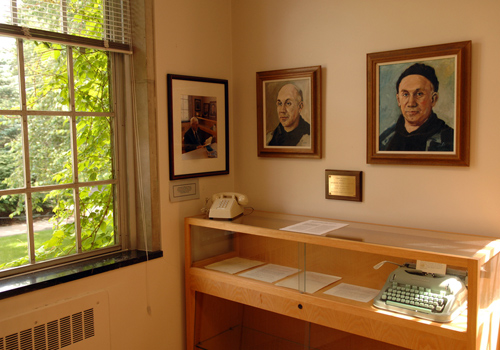Special Collections
Browsing Area
The Browsing Area near the Information Desk houses several collections. The McNaughton Collection is a subscription service that delivers new, popular fiction books that are usually not academic in nature, thus not added to our permanent collection. New Acquisitions are books that are recently acquired by the library, and are on display to highlight them due to current interest or availability. Our popular fiction has books that have enduring themes, or are currently popular with our students, and include our Young Adult fiction books. We also keep daily newspapers and some popular magazines in this area. In addition, we keep shelves of DVD's of popular movies, and a collection of board games for students to check out.
Popular Fiction
Our popular fiction has books that have enduring themes, or are currently popular with our students, and include our Young Adult fiction books.
Children's Literature Room
The Children's Literature room holds a substantial collection of fiction and non-fiction children's books. Kits for teaching and learning are also available in this space. These resources include tactile, sensory, phonic, musical, and exploration tools and games. A further special collection housed within the room is the Barbara Davis Holiday Collection. Barbara Davis, in addition to being Associate Library Director and Head of Reference for many years, was also an alumna, benefactor, mentor and teacher to generations of Nazareth students. Her donation of Christmas books makes up a sizeable portion of the holiday collection. The collection also now includes books that represent a diverse range of holidays and celebrations.
Institutional Repository
The Nazareth University Institutional Repository serves to digitally preserve and provide long-term access to the scholarly record of Nazareth University. Original works of scholarship by Nazareth faculty, staff and students, as well as items of historical interest from the University Archives, are added to the IR's digital collections on an ongoing basis.
Rare Book Room
The Rare Book Room houses books of exceptional value or limited holdings and availability.
Chesterton Collection and Faculty Pubs
Within the reading room under the grandeur of the Saint Jerome Window is the Chesterton collection, which includes several small collections of 20th century writers including Gilbert Chesteron, Hilaire Belloc, the Sitwells, and Maurice Baring. Also included in this area are our collections of Faculty and Staff publications and student theses.
Thomas Merton
The Thomas Merton Room houses a collection of books, tapes, videos and letters, focusing on and around the works of Thomas Merton. Access to the Thomas Merton Letters are available by appointment.

- Tiktok
- YouTube
- ZeeMee
© 2025 Nazareth University • Copyright/Privacy • Diversity • Student Right to Know • Employment